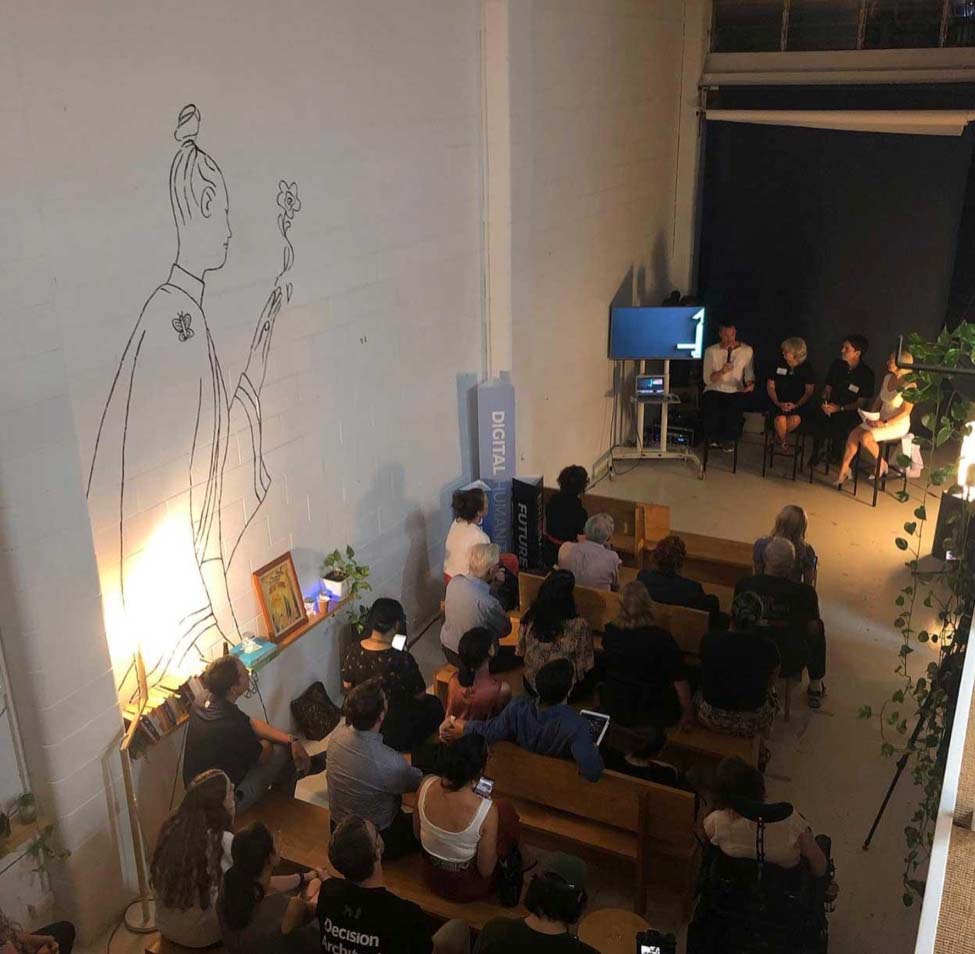“I’m not comfortable with my body, so I want to get rid of it. This thing. All the arms and legs and every single bit of it. I don’t want to be flesh. I’m going to escape this thing and become digital. I want to live my life forever as information.”
Bethany, the Years and Years transhumanist character, demonstrates the conundrum posed by merging human and machine. The short video presented outlined Bethany’s desire to live eternally as information:
Two parents are worried. Their teenage daughter Bethany has been hiding behind a 3D animated emoji mask and has scheduled a talk with them. Trying to figure out what they’re up against, they sneak a peek at her internet searches. When they discover that she’s been searching for information about being trans, they’re relieved; they can handle a transgender child.
Except when it comes time for their talk, Bethany tells her parents she’s transhuman and that she wants to “live forever as information.”
This set the scene for the night’s conversation with an incredible array of more than suitably qualified people to lead the discussions:
- Dimity Dornan, Executive Director & Founder at Hear and Say / Bionics Queensland;
- David Douglas, a Postdoctoral Fellow (Responsible Innovation in Robotics and AI) at CSIRO;
- Fiona Kerr, Founder and CEO at The NeuroTech Institute and
- Benjamin Richards, Executive Producer at Apothecary Films.
A strange new world
How do we address the issue of being more online than not? What happens when we blend our bodies with technology? And how and where are the ethicists who are ensuring we actually consider the impacts of our actions?
Is technology evil? We all know that technology is changing at a pace that is difficult to keep up with .. especially when we are trying to keep up with our busier and busier day-to-day lives.
Humans opened the Pandora’s box of merging technology and biology a long time ago, and we’re now speeding head-on into the consequences, despite not knowing what humanity will become.
Integrating bionics into humans holds out the prospect of fuller participation by people with previously untreatable conditions.
The belief that humans should use technology to escape suffering and to expand human abilities is now real. Benjamin Richards, the Executive Producer at Apothecary Films, shared an example of VR being used by paraplegics where they could see their limbs move which in turn created new neural pathways, to the extent that some patients regained bladder control and in some cases increased muscle strength to allow them to drive.
The use of technology to enhance life can also be seen in this video – grab your tissues and watch (your first assumptions will be challenged): (https://www.youtube.com/watch?v=XPluc5BJNlE&feature=youtu.be)
How do we regulate the speed of change to ensure policy and ethical issues are considered before it’s too late?
We need to remember that technology itself is neutral, but in the hands of humans, it can be the vehicle for destruction or for deliverance.
Depending on who wields it and how, technology can be or do just about anything. That also means that those who wield it can be or do just about anything.
So how do we ensure that we understand the consequences of new digital and tech developments? No one knows what it would mean for humans to become data or to exist forever in the cloud, but we do know that such an advancement would fundamentally change humanity. That’s neither inherently good nor inherently bad; change is constant and inevitable.
We need to SLOW. THINGS. DOWN.
This was the sentiment across the panel. The ethicists need time to consider the consequences of new digital and tech developments. And if we continue to push and develop at the rates we have seen in recent years, we do not allow time for that consideration.
The panel noted that there is some relief knowing that companies like Apple are slowing down some of their release timelines on things like wearables. Despite having over 1000 engineers working on these products, the delay is, in fact, good as it allows policymakers and ethics-implementers time to catch up pre-law and regulate products before mass-adoption.
We also need to take the rose coloured glasses off and think about what happens when the tech goes wrong. How is it regulated? And how do companies adhere to ethics that haven’t yet been articulated?
On hope for the future
How do we ensure we create a future that is for the greater good rather than one that lines the pockets of the few (especially when we know companies like Google have removed their “do no evil” mantra)?
On this Fiona Kerr, Founder and CEO at The NeuroTech Institute, very eloquently suggested that perhaps we need to simply start with the human-centric questions. If we start with a positive question and look at how technology can assist us in finding the answer we will succeed.
If we start with “how can we make more money” or “how can we build a mass scaling product” … we are doomed to fail.
Dimity Dornan, Executive Director & Founder at Hear and Say / Bionics Queensland, reinforced the sentiment of technology for good when she said:
“If you are ever worried about whether tech is good or evil, you simply need to watch the face of a deaf child who (thanks to bionic implants) hears the sound of their parent’s voice for the first time.
We all have our own perceptions of technology and its place in the world, mine were somewhat sci-fi stereotypical. I think we all need to take the time to rethink the direction, drivers and impact of technology on how we think. We should be willing to look for new solutions and more nuanced consideration of how our future lives will be impacted so that we can help steer things in a positive direction.
……..
Thank you to Ben Johnston, CEO of Joseph Mark for both hosting and moderating the event.
Thank you to Lisa and her team at Bright Humans for creating the Night Nomad series.
Thank you to the panelists who are truly incredible in their respective fields.







